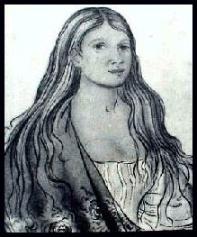Before the Europeans brought their chauvinistic attitudes to
America, Cherokee women enjoyed an unbiased equality in their culture. It was not uncommon for a woman to be peace
chief of their village or nation. Women
were war chiefs, high priests, and doctors.
Women were just as likely to be a witch or a wizard as a man was. Even the most feared killer witch, the Raven
Mocker, could be a woman!
And in some arenas, women clearly held a superior role! The Cherokee were a matriarchal society. The children were born to the woman’s clan,
not the man’s. It was the woman’s family
who taught the children their role in society.
If a woman of the Ani Kawi, “Deer Clan”, married a man from the Ani
Waya, “Wolf Clan”, the children would be raised to be hunters, not warriors.
In times of war, the fates of prisoners were determined by
the Ghigau (Ghee gah oo), “Beloved Women”!
A prominent woman from each clan would meet, dance, smoke sacred
tobacco, and judge prisoners or criminals and set their punishment.
 |
| Nanyehi drawn by Caitlan |
The European culture viewed the role of women in Cherokee
government with disdain! In the early 1700’s,
the trader Adair coined the phrase “petticoat government” to describe the
prominence of the women’s role. By this
time in history, Beloved Women were becoming rare. But, in 1738, in the Cherokee town of Chota,
a most remarkable woman was born. Her
name was Nanyehi (“one who goes about”).
At age 14, Nanyehi married a Cherokee named Kingfisher. They fought side-by-side at the Battle of
Taliwa against the Kusa (Creek) Tribe in 1755.
When Kingfisher was killed, Nanyehi picked up his rifle and led the
Cherokee to victory. For her bravery,
she was given the title of Gighau (Beloved Woman). In 1781, when the Cherokee met an American
delegation to discuss white settlements on the Little Pigeon River, Nanyehi was
surprised to find no women in the American delegation and confronted the
leader, John Sevier. Sevier countered
that he was equally appalled to find a woman involved in such important
work! Nanyehi’s moving response was, “"You know that women are always
looked upon as nothing; but we are your mothers; you are our sons. Our cry is
all for peace; let it continue. This peace must last forever. Let your women's
sons be ours; our sons be yours. Let your women hear our words."
The comment box has been fixed. You are now free to leave comments if you wish to.
ReplyDelete